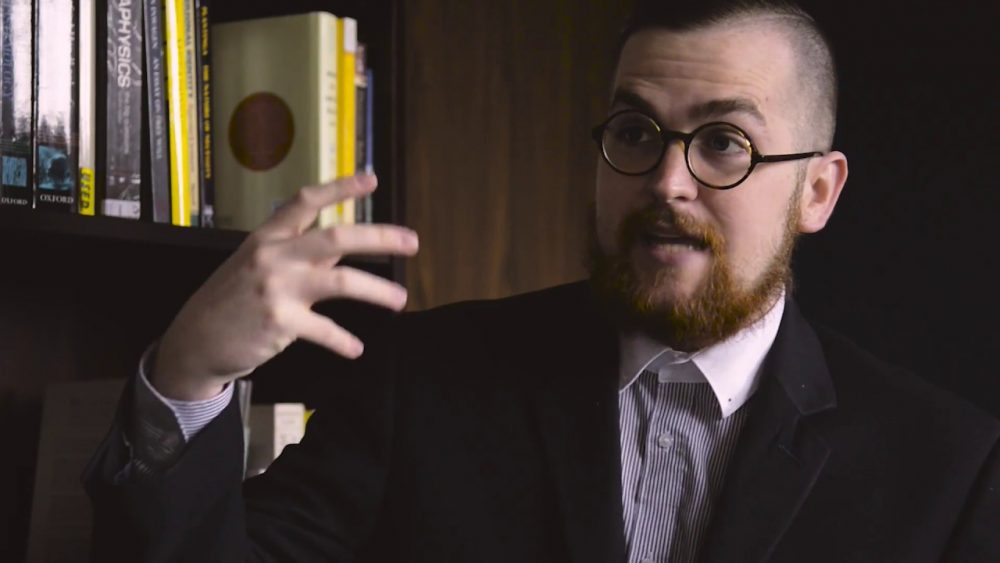Marco Carvalho
A new scientific book by French writers Michel-Yves Bolloré and Olivier Bonnassies on the relationship of science to the divine claims that some of the latest scientific discoveries prove the existence of God. The authors argue that scientific advancements in areas such as relativity, quantum mechanics, the complexities of living organisms, the thermal death of the Universe and, in particular, the Big Bang theory are strong enough to overturn the belief and convictions of any atheist who does not believe in the existence of God. In Macau, the question of the existence of God will be under scrutiny at the University of Saint Joseph. Starting from next Thursday, the local Catholic University will try to answer questions such as “Can we know that God exists?” or “Is there evidence for God?” in a series of lectures promoted by the Faculty of Religious Studies and Philosophy. An Associate Professor of Philosophy at USJ, Tyler McNabb will argue, in the inaugural lecture, for the thesis that religious belief can be rational, justified or warranted apart from argument. O Clarim spoke with Professor McNabb.
People were led to believe that faith and reason, science and religion contradict each other and are somehow antagonistic. How wrong is this perception?
Right. It’s really unfortunate that many have left the Christian faith due to incorrectly believing that Christianity is at odds with science. Perhaps the most standard approach to showing that there is some inconsistency between the two relates to Neo-Darwinian evolution. For example, it has been said that Neo-Darwinian evolution is at odds with the Genesis account of creation. If there is conflict here, it’s extremely superficial once one understands that the genre of Genesis 1-11 is mytho-history. God is not intending to teach us cosmology or biology here. Rather, Genesis 1-11 conveys kernels of historical truths expressed in theological prose so that we can better understand the human condition. Perhaps, a slightly more sophisticated objection is that there is conflict in thinking that (A) God created human beings, and, (B) Humans are the result of natural selection and genetic random mutation. Again though, here the conflict is purely superficial. When biologists use the word ‘random’ they don’t mean to endorse a metaphysical statement that the process of evolution is not guided by God. Rather, it’s generally understood as the denial of there being a physical mechanism inside the organism that is dictating the next mutation. And of course, it is logically consistent to think that God has utilized natural selection to bring us humans about. If you ask me, if we want to look for conflict, we should look to the field of cognitive science of religion. Perhaps it will come as a surprise to learn that the paradigm view within the field is that religious belief is an evolutionary spandrel. Humans are natural believers in the supernatural. I’ll be addressing how religious belief fits well with cognitive science of religion in the lecture.
Can religious belief be justified by reason?
I wonder what you mean by ‘reason’ here. I will argue in the lecture, following Alvin Plantinga, that we can know that God exists apart from having access to successful arguments for theism, though I do think there are good arguments for theism. The story that I will tell to make this plausible will relate to having properly functioning cognitive faculties that are aimed toward producing immediate theistic belief. I suppose I don’t want to reveal all of my tricks here so I will once again punt to my lecture for a further explanation if that is OK!
Do you agree with French authors Bolloré and Bonnassies that the existence of God can be proven by science?
I haven’t read Bolloré and Bonnassies, though it sounds like something I’d be interested in! I do think we can utilize evidence from science in order to show that theism is an overall probable hypothesis. Theism as a hypothesis is a simple hypothesis (it postulates one maximally great immaterial mind [or something near about]), especially in comparison to hypotheses that postulate countless other universes and multiverse generating mechanisms as the most viable naturalistic hypotheses do. So, the intrinsic probability of theism fairs well. Now, I think we can also argue that theism has a lot of explanatory and predictive power. For example, following Richard Swinburne, I think we can say that theism predicts that there would be a complex universe, that there would exist immaterial minds, that human beings would possess moral knowledge, and so on. And I don’t think alternative competing non-theistic hypotheses will be able to predict this evidence just as well. So, overall, I think the theist hypothesis is in pretty good shape. I also want to mention that I think there is compelling evidence for the historical resurrection of Jesus which I don’t have time to get into here. However, in this lecture series, Michael Licona from Houston Baptist University will be delivering an online lecture highlighting this evidence. He will also be available for Q&A after.
How can a cognitive approach to faith and to a religious belief change the very idea of religion?
I don’t want to change religion. I like religion. We are religious animals after all! While I think religious doctrine can develop, I want to make sure that religious traditions are faithfully represented. So, I suppose the focus of my lecture will not be on changing the idea of religion but rather it will help explain how traditional religious faith can be rational.
Can we know for sure that God exists? What sort of epistemological evidence can we collect in order to prove the existence of God?
We can define certainty in many different ways. I definitely think human beings can possess psychological certainty that God exists, and our experiences can play a big role in all of this. Imagine you pick up a delicate flower next to a giant waterfall. You begin to study and look at all the flower’s intricacies. You immediately find yourself with a strong experience that forcefully moves you to believe that God created this. Your belief isn’t based on any argument or inference. You simply are so powerfully moved by this experience that you become psychologically speaking, certain that God created the flower. Now, according to the latest and most popular epistemic theories that I will survey in the lecture, this experience can lead to your belief being justified, rational, warranted, and so on. So, long story short, if you are reading this, you should come to the lecture!
(For more information on Professor McNabb, please check his web page http://tylermcnabb.com/)


 Follow
Follow


